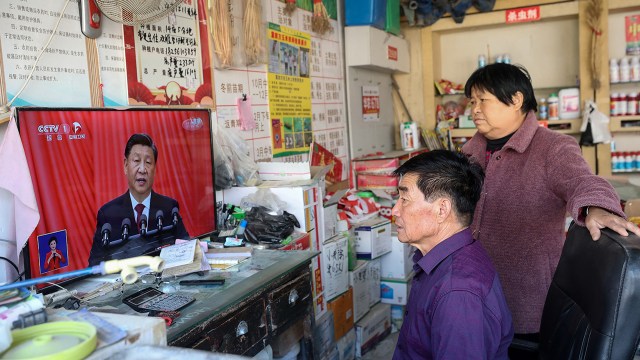
Chinese President Xi Jinping is likely to secure a third term in office during the country’s 20th Communist Party congress, a gathering held every five years that began in Beijing on Oct. 16.
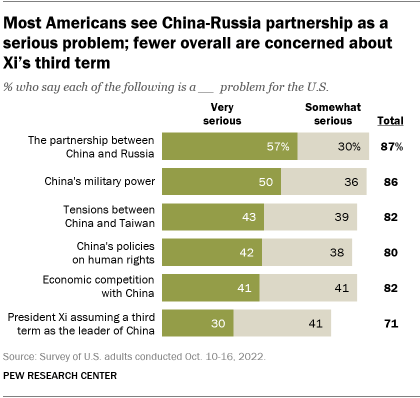
For Americans, however, the potential for a third term for Xi is not among the most pressing concerns when it comes to China, according to a new Pew Research Center survey.
Only three-in-ten Americans say it is a very serious problem for the United States if Xi assumes a third term as China’s leader. Larger shares express concern about the other issues asked about in the survey, which was conducted Oct. 10-16 among 5,098 U.S. adults.
Pew Research Center has long tracked Americans’ attitudes about the relationship between the United States and China. For this analysis, we surveyed 5,098 U.S. adults from Oct. 10 to 16, 2022. Everyone who took part in this survey is a member of the Center’s American Trends Panel (ATP), an online survey panel that is recruited through national, random sampling of residential addresses. This way nearly all U.S. adults have a chance of selection. The survey is weighted to be representative of the U.S. adult population by gender, race, ethnicity, partisan affiliation, education and other categories. Read more about the ATP’s methodology.
Here are the questions used for this analysis, along with responses, and its methodology.
For example, a 57% majority of Americans say the partnership between China and Russia is a very serious problem for the U.S., while half say the same about China’s military power. At least four-in-ten see tensions between China and Taiwan (43%), China’s policies on human rights (42%) and economic competition with China (41%) as very serious problems.
Since March, there have been some changes in Americans’ views of the key challenges for the U.S. when it comes to China.
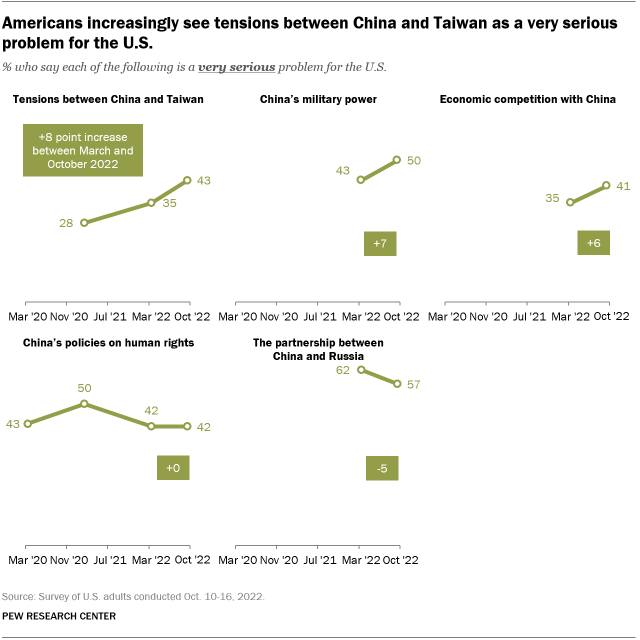
The public is now 8 percentage points more likely than in March to say that tensions between mainland China and Taiwan are a very serious problem for the U.S. The increase follows House Speaker Nancy Pelosi’s visit to Taiwan in August, a trip that made her the highest-ranking U.S. lawmaker to visit in 25 years and led to strong Chinese criticism and military maneuvers, among other responses.
China’s military power is also of growing concern to Americans. The public is 7 points more likely than in March to see China’s military capacity as a very serious problem. Beyond China’s military drills in the Taiwan Strait following Pelosi’s visit, China has been expanding its naval capacity and has bolstered its presence in the Pacific thorough recent security pacts and the creation of artificial islands.
The sense that economic competition with China is a very serious problem for the U.S. has similarly intensified since March. The share of Americans who express concern about competing with China economically has grown by 6 points since then. President Joe Biden signed the CHIPS and Science Act into law in August and recently announced further measures to curb China’s access to and ability to produce advanced computer chips, citing concerns about U.S. competitiveness and national security. Roughly half of Americans were also concerned about China’s growing technological power in a separate Pew Research Center survey in 2021.
While China’s partnership with Russia remains a top concern for Americans, the public is 5 points less likely than in March to see this as a very serious problem for the U.S. The earlier survey was fielded just a few weeks after Russia’s military invasion of Ukraine.
The share of Americans who see China’s human rights policies as a very serious problem for the U.S. is unchanged from March.
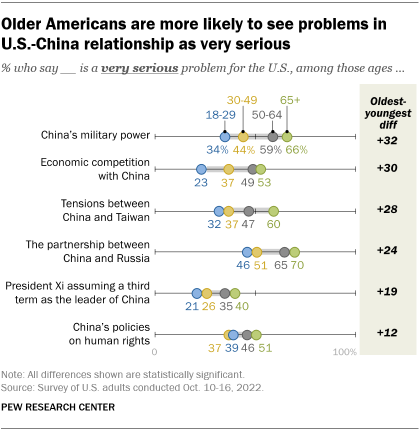
As has often been the case, older Americans are more concerned than younger Americans about each of the items asked about in the Center’s new survey. For example, those 65 and older are 32 percentage points more likely than those ages 18 to 29 to see China’s military power as a very serious problem for the U.S., and these older Americans are 12 points more likely than the youngest adults to say the same about China’s policies on human rights.
Similarly, Republicans and independents who lean to the Republican Party are more likely than Democrats and Democratic leaners to see most issues in the bilateral relationship as very serious problems. This is true across five of the six problems posed in the Center’s new survey; the one exception is China’s policies on human rights, which similar shares of Republicans and Democrats see as a very serious problem for the U.S. (43% each).
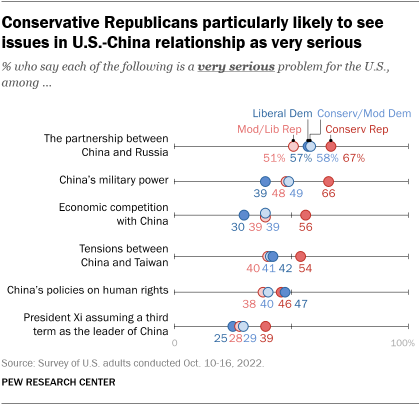
On many issues, conservative Republicans stand apart from moderate and liberal Republicans. Conservative Republicans, for instance, are the most likely to describe China-Taiwan tensions as a serious problem for the U.S. (54%), while moderate and liberal Republicans (40%) differ little from conservative and moderate Democrats (41%) or liberal Democrats (42%).
Americans with at least a college degree are also slightly less likely than those with less schooling to see some of these problems as very serious for the U.S. The educational gap is largest when it comes to Xi assuming a third term as the leader of China: College graduates are 8 points less likely than nongraduates to see this as a very serious problem (25% vs. 33%). There are no differences of opinion by education on the question of the China-Russia partnership or tensions between mainland China and Taiwan.
Majority of Americans say the U.S. should continue political visits to Taiwan
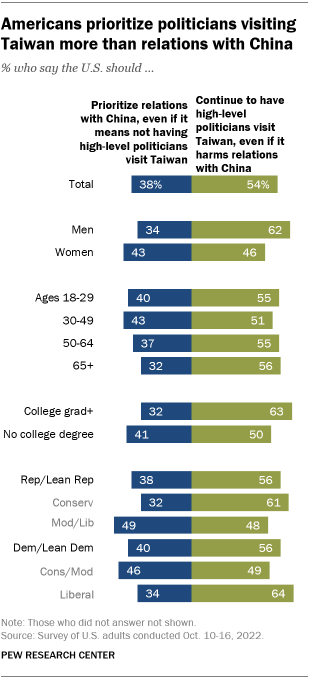
When asked if the U.S. should continue to have high-level politicians visit Taiwan even if it harms bilateral relations with China, 54% of Americans say it should. In contrast, 38% say the U.S. should prioritize relations with China rather than sending politicians to Taiwan.
Men are more likely than women to favor diplomatic visits, as are Americans with a college degree relative to those with less schooling. (Women and those with less education were more likely to skip this question.)
There are no significant partisan differences in Americans’ opinions of how the U.S. should approach future diplomatic travel to Taiwan. Republicans are as likely as Democrats (56% each) to prioritize U.S. officials visiting Taiwan.
But there are marked differences between conservative Republicans and moderate and liberal Republicans on this question, as well as between more moderate and conservative Democrats and liberal Democrats. In fact, conservative Republicans and liberal Democrats are about equally likely to say the U.S. should continue to send high-level politicians to Taiwan (61% vs. 64%), while moderates in each party are considerably less likely to hold this view (48% of moderate and liberal Republicans say this, as do 49% of moderate and conservative Democrats).
Americans who think tensions between mainland China and Taiwan are a very serious problem for the U.S. are more likely than those who say they are less serious to think high-level visits should be pursued (63% vs. 49%).
Note: Here are the questions used for this analysis, along with responses, and its methodology.





